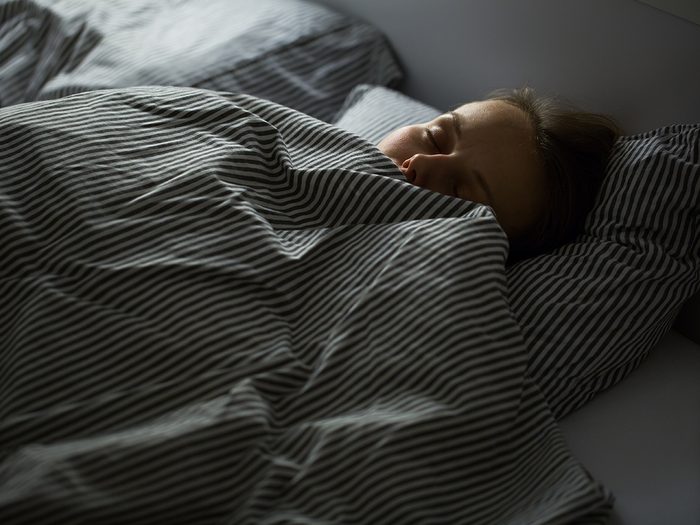7 Weird Things That Happen to Your Body When It Starts to Get Dark Out Earlier

Yes, there's SAD (seasonal affective disorder), but also these surprising side effects.
1. You might not feel as sharp
If your brain feels a bit fuzzy as the cold weather rolls in, you could have the lack of sunlight to blame. One survey of 16,800 participants found an association between decreased exposure to sunlight and increased cognitive impairment. If you arrive at work before the sun rises and leave after it’s gone down, schedule time in your day to take a walk: Even just 15 minutes of midday sun could stimulate the neural pathways necessary to get you back in prime thinking mode.
2. You might go to bed earlier
Because of the human body’s finely tuned circadian rhythm, earlier sunsets typically lend themselves to earlier bedtimes. And because wake-up times are often fixed by school and work timetables, this tends to mean we tend to sleep more in the months with less daylight. So what’s a night owl to do? Let it go: Researchers behind the study that found this correlation saw earlier bedtimes as a good thing, and even suggested manipulating lighting schemes during spring and summer to reduce evening light in order to produce a similar effect as what naturally occurs in fall and winter.
3. You could feel less inspired to exercise
It’s dark, there’s a chill in the air, and you still haven’t gone to the gym. Think daylight has an influence on your motivation? Science says it does. One study of over 23,000 children showed that longer evening daylight was associated with a small increase in daily physical activity. That means when it’s light out longer, we’re more likely to hit the gym. And when it’s not—well, we’re more likely to hit the hay. Counteract your natural inclinations by signing up for an exercise class in advance. That way, you’ll be able to get into the habit before the sun starts setting earlier, and once it does, you’ll feel more inclined to get your money’s worth of a prepaid package.
4. You’re more susceptible to feeling blue
Perhaps the underlying factor behind other symptoms related to the change in daylight is our susceptibility toward depressive behavior due to minimal exposure to daylight. One University of Pennsylvania study on rats found that feeling blue in winter isn’t only in our heads. After they experienced darkness for six weeks, neurotransmitters involved in transporting dopamine and serotonin (hormones involved in emotion) actually died. This could be an underlying mechanism involved in seasonal blues. If you notice yourself feeling down in the dumps as soon as it begins to get darker earlier, look into purchasing a natural-spectrum energy lamp.
5. You’re more likely to have a heart attack
In 2008 a team of researchers in Sweden found that the rate of heart attacks following the first three weekdays after daylight savings time increased by about 5 percent. This is most likely due to people changing their sleeping patterns. Lack of sleep releases stress hormones which cause inflammation. Inflammation can cause severe complications in people already at risk of having a heart attack.
6. You’re more likely to “cyberloaf”
Cyberloafing is the slang word for surfing the web for entertainment purposes at work. This is at an all-time high the first Monday after daylight savings time. Many people don’t have as high motivation to work due to lack of sleep so they waste time by surfing the web instead.
7. Cluster headaches might strike
During daylight savings time your circadian rhythm gets out of whack. These changes often present themselves in the form of pain. A common way people are affected is by getting cluster headaches, or a headache that is on one side of a person’s head and lasts a long time.
Next: Does Daylight Savings Have a Negative Effect on My Sleep?




